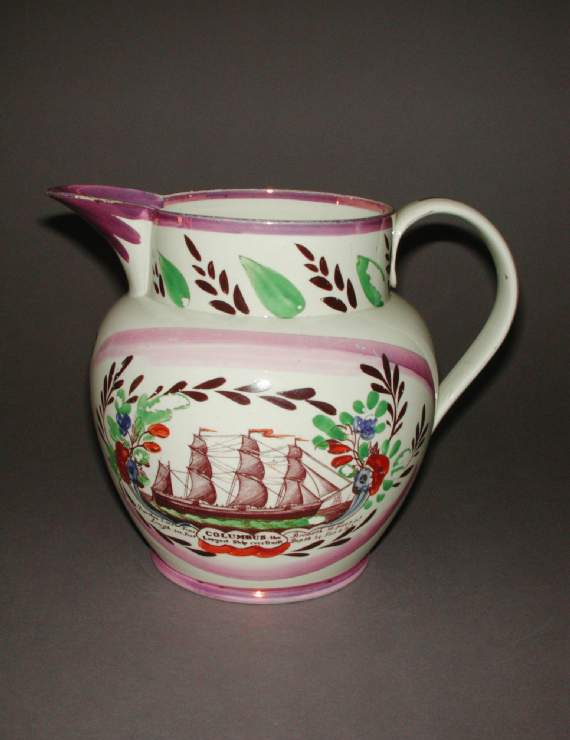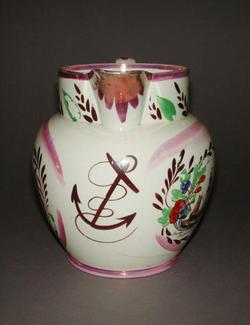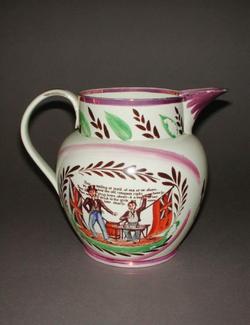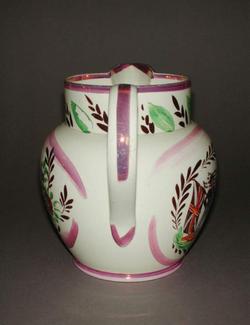Current Location: Gallery 27 (Glaisher)
Titles
Columbus jug
Maker(s)
Factory:
Unidentified Pottery
Entities
Categories
Description
White earthenware, transfer-printed in brown with text and images, and painted with enamels and pink lustre.
Ovoid body tapering slightly to a projecting foot, with cylindrical neck, curved spout and loop handle. Decorated on the body with two transfer-prints over-painted with enamels, each surrounded by a wreath of brown, stylised leaves and with a thinly painted stroke of pink lustre above and below. A line of lustre runs round the rim and foot and down the handle; the neck is decorated with stylised leaves in green and brown. Under the spout is a large anchor, in brown. The underside is flat and glazed, with a raised foot-rim.
The images and text are as follows:
(i) On one side, two sailors drinking, with a Union Jack, a red ensign and verse:
‘Thus smiling at peril at sea or on shore / We box the old compass right cheerly / Toss the grog, boys - & a song or two / Then we’ll drink to the girls we more love dearly.’
(ii) on the other, a fully rigged four-masted sailing ship in full sail, between sprays of red and blue flowers and green leaves, inscribed ‘COLUMBUS the Largest Ship ever Built. Burthen 6,000 tons. Length, 301 feet. Breadth, 50 feet, 7 Inh. Depth 29 Feet 6 Inh.’.
Notes
History note: Bought from Mr E. Burr, 5 Silver Street, Bedford on March 3, 1910 for £1.1. , by Dr Glaisher, Trinity College, Cambridge.
Legal notes
Dr J.W.L. Glaisher Bequest
Measurements and weight
Height: 18.7 cm
Acquisition and important dates
Method of acquisition: Bequeathed
(1928)
by
Glaisher, J. W. L., Dr
Dating
19th Century, Early
William IV
Circa
1826
CE
-
1830
CE
Note
Although often known as ‘Sunderland ware’, lustre-ware was also an important product of potteries in the Newcastle-upon-Tyne area and both had a substantial export market as well as domestic customers. Typical features include thinly hand-painted lustre, together with hand-painted transfer-prints which feature designs, verses and mottos, often featuring shipbuilding, bridge or seafaring themes. The brown transfer prints, sprays of stylised brown leaves and the use of bright red, blue and green enamels on this jug are typical of the Newcastle potteries; the restrained use of lustre suggests a date of c.1826-1830.
Components of the work
Decoration
composed of
ceramic printing colour
( chocolate-brown)
lustre
( pink)
enamel
Body
Materials used in production
Lead-glaze
Earthenware
References and bibliographic entries
Identification numbers
Accession number: C.1091-1928
Primary reference Number: 71297
Old object number: 3193
Stable URI
Audit data
Created: Saturday 6 August 2011
Updated: Tuesday 30 April 2024
Last processed: Tuesday 15 July 2025
Associated departments & institutions
Owner or interested party:
The Fitzwilliam Museum
Associated department:
Applied Arts







